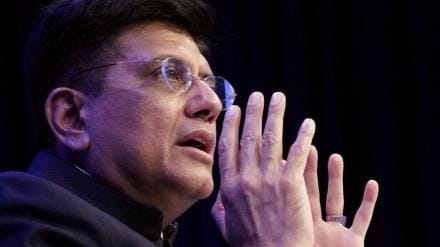India will oppose bringing in issues in the World Trade Organisation (WTO) that are not linked directly to trade and try to ensure that the guiding principles of the global trade regulating body are maintained, commerce and industry minister Piyush Goyal said Friday.
“India is very much engaged with all the partner countries bilaterally, in smaller groups and at the larger forums (also) to ensure that the guiding principles on which the WTO was formed are respected and maintained and continue to help us to have a free and fair trade across the world,” the minister said at the Raisina Dialogue.
Developed nations are pushing to start talks on new issues like trade and environment, labour, gender, trade facilitation and MSMEs in the WTO. India and some other developing countries are of the view that these issues are best discussed at the forums available for them and not be used to curb exports.
The minister also said that India will raise the issue of the Carbon Border Adjustment Mechanism or Carbon Tax that the European Union will collect based on the carbon emission intensity of a product at the WTO. He said the issue will also look to address this issue bilaterally with the 27-member bloc.
He said at the 13th Ministerial Conference of the WTO that will be held in Abu Dhabi from February 26 to 29 several issues that have been discussed over the years need to be brought to conclusion.
India is seeking a permanent solution to the long pending issues of public stockholding of food grains and government procurement, final decision on fisheries subsidies, end to moratorium on taxation of electronic transmissions across borders and getting back the dispute resolution mechanism working again. “So there is a very heavy agenda,” he said.
The dispute settlement mechanism at the WTO has been non-functional since 2019 as the US blocked appointments of members to the appellate body. Now discussions at WTO on what share the dispute settlement should take in the future.
Though the appellate body stopped functioning, the dispute settlement panels are still working. But because the appellate system is non-functional all rulings by the dispute settlement panel go unimplemented.
“I do hope that other countries will also come to the table with a positive attitude as does India…(I do hope that) other countries are also willing to listen to us and other less developed and developing countries’ concerns and give free and fair solutions to the problems,” Goyal said.
He said with all its problems, difficulties, short-comings, and fault-lines, the Geneva-based multi-lateral body has played an important role in setting robust rules of business, and fair play among trading nations.
